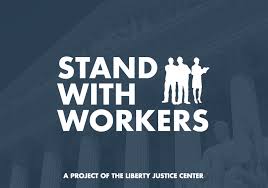
Massachusetts House Speaker Robert A. DeLeo said Wednesday that lawmakers intend to pursue legislation in the coming weeks to “soften the blow” on unions after the Supreme Court ruled that it was unconstitutional to require government employees to pay union fees.
DeLeo said that the details of any potential legislation are far from settled and that lawmakers plan to speak with union leaders to find a “consensus that we can support.”
But he indicated the Legislature intends to move fast. He said he hopes to move a bill to the House floor before the legislative session wraps at the end of July. The top leader in the Senate, President Harriette L. Chandler, also hopes to craft a bill by then, according to an aide.
“We as a House will be taking some action . . . to soften the blow, shall we say, relative to our unions here in Massachusetts,” DeLeo told reporters after a Democratic caucus at the State House. The Winthrop Democrat said the 5-4 ruling in Janus v. American Federation of State, County and Municipal Employees, which overturned a 40-year-old precedent, “could be quite a bit of loss in terms of revenue for our unions.”
“So we just want to make sure that unions still have a place here in Massachusetts and they play a role again in the Massachusetts economy,” he said. “Any issues that come up that could limit the role that they play could be detrimental to our economy. That’s what we want to take a look at.”
RELATED LINKS
Supreme Court deals big setback to labor unions
Chandler is “absolutely” interested in pushing a bill to respond to “this anti-worker decision,” said Scott Zoback, her deputy chief of staff.
“We will continue the conversations that have already started with unions and try to determine an appropriate path forward,” Zoback said.
Union leaders did not say what type of bill they support under the ruling.
Barbara Madeloni, president of the Massachusetts Teachers Association, spoke in broad terms, saying legislation would be focused on “making sure we preserve the freedom and right for every worker in Massachusetts to join a union and be powerful in that union.”
“We’re going to be putting our heads together and work on that,” said Steven A. Tolman, president of the Massachusetts AFL–CIO.
“There’s always going to be a percentage of discontented people,” he said of the potential of some leaving unions in the wake of the ruling. “But in many ways, we’re looking at this as a positive. We’re going to grow the labor movement.”
The court case involved an Illinois state government worker named Mark Janus, who argued employees should not have to help fund unions because everything unions do is political.
The ruling won praise from, among others, the right-leaning Pioneer Institute, which had signed onto an amicus brief urging the Supreme Court to hear the case and argued that it could have a wide-ranging effect on unions’ political activity.
“Pioneer believes that the constitutional guarantee of freedom of association means that just as union membership should never be banned, no one should ever be compelled to contribute to an organization with which s/he does not agree,” the group said.
But state union officials, who highlighted increased public support for unions in recent years, decried the decision as “misguided” and an attack on worker rights. A 2017 Gallup poll found that national public support for unions was at 61 percent — the highest it has been since 2003.
Peter MacKinnon, president of Service Employees International Union Local 509, said it expects its ranks to grow despite the ruling.
“Today, the Supreme Court came down on the wrong side of history in a case that the rich and powerful are hoping will divide us,” he said in a statement. “But no court case is going to stop us from fighting for the strong unions our communities need.”
Other labor leaders in Massachusetts — one of nearly two dozen states that allow public unions to charge nonmembers a fee for collective bargaining — also said they expect continued growth.
“Members of the AFT Massachusetts enjoy the strength and solidarity that comes with union membership, and we expect that our membership will continue to grow despite the Janus decision,” American Federation of Teachers Massachusetts president Beth Kontos said.
The ruling was not unexpected, said Jessica Tang, president of the Boston Teachers Union. Previous court decisions and its current composition all pointed to Wednesday’s outcome in advance of the ruling, she said.
Private workers cannot be required to join a union and pay membership dues. But 22 states, including Massachusetts, allow public-sector unions to charge nonmembers a discounted rate, known as an agency fee or a fair-share fee, to cover collective bargaining. The fees are designed to pay for union negotiations over bread-and-butter issues such as pay, benefits, and working conditions, but exclude the cost of the union’s political activities.
In February, Daniel DiSalvo, a senior fellow at the conservative Manhattan Institute, estimated public-sector unions in states like Massachusetts could see a 20 percent drop in membership and revenue if the court ruled as it did Wednesday.
Michael Levenson of the Globe staff contributed to this report. Jamie Halper can be reached at jamie.halper@globe.com. Follow her on Twitter @jamiedhalper.


